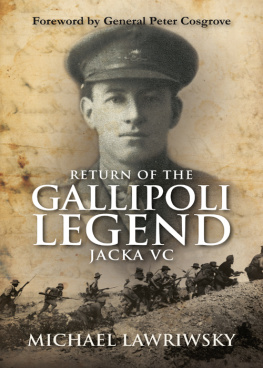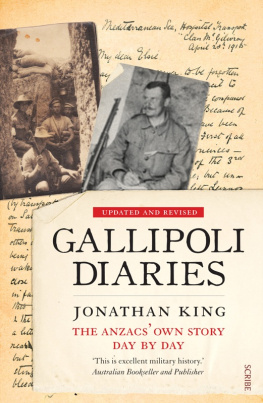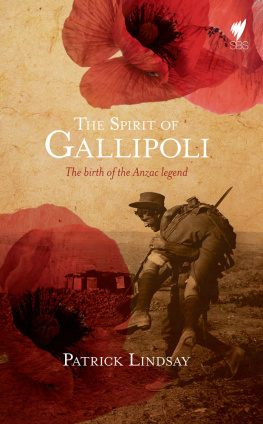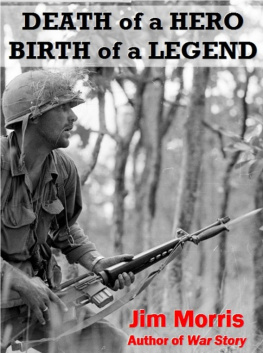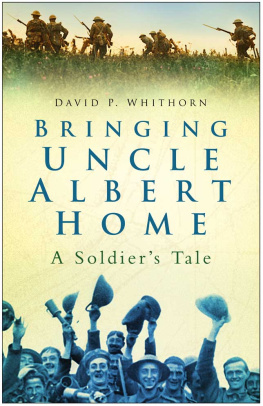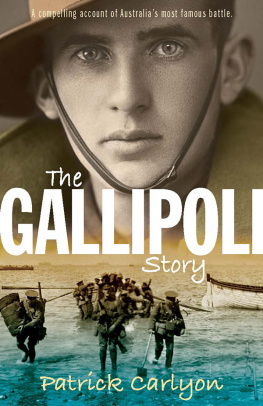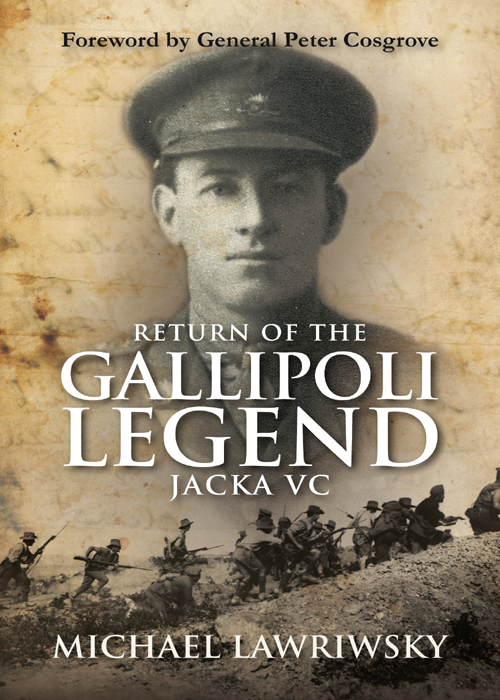For my father-in-law who was a good man.
Return of the
Gallipoli
Legend
Jacka VC
Michael Lawriwsky

www.harlequinbooks.com.au

ISBN: 9781742786971
TITLE: Return of the Gallipoli Legend: Jacka VC
First Australian Publication 2011
Copyright 2011 Michael Lawriwsky
All rights reserved. Except for use in any review, the reproduction or utilisation of this work in whole or in part in any form by any electronic, mechanical or other means, now known or hereafter invented, including xerography, photocopying and recording, or in any information storage or retrieval system, is forbidden without the permission of the publisher, Harlequin Mills & Boon, Locked Bag 7002, Chatswood D.C. N.S.W., Australia 2067.
This is a work of fiction. Names, characters, places, and incidents are either the product of the authors imagination or are used fictitiously, and any resemblance to actual persons, living or dead, business establishments, events, or locales is entirely coincidental.
MIRA and the Star Colophon are trademarks used under license and registered in Australia, New Zealand, Philippines, United States Patent and Trademark Office in other countries.
For questions and comments about the quality of this book please contact us at Customer_eCare@Harlequin.ca.
www.harlequinbooks.com.au
RETURN OF THE GALLIPOLI
LEGEND
A foreword by General Peter Cosgrove (Retd)
This new book by Michael Lawriwsky is another cracker!
In Michaels first book, Hard Jacka we read about the paladin of the 1st Australian Imperial Force, Captain Albert Jacka, VC, MC and bar. An astonishing courage under continuous circumstances of mortal danger was the quality at the core of this famous man, so naturally the first book told the story of how Jacka became Australias first VC winner of World War I and how he soldiered on in the most gallant way throughout the rest of that vicious and bloody conflict. Hard Jacka was a thrilling read with Michaels device of ascribing dialogue to emotions and events working particularly well because it put the living flesh of realism on the dry bones of history. We felt we were in the trenches with Bert Jacka and his comrades-in-arms. But we needed to know more about this Australian, lionised and cherished not only by the men with whom he served but also by the nation in whose service he excelled.
In the sequel, Return of the Gallipoli Legend, Michael has again brought his forensic microscope of accuracy and his empathetic and persuasive ear for the human interaction involved in this, the wider story of Albert Jacka, a hero returned home, a returned man trying to make a home. We reflect and read about a man who can never escape his public prominence but who is subject to the same doubts, inadequacies and failures of many of his comrades in the peace which followed war. Before I started the Return, I wondered if my feelings towards Jacka would change for the worse after reading of his life out of uniform, all too soon cut short. Of course, the opposite is true the ordinariness of Bert Jacka, his anxiety, his setbacks, his estrangements all just underscore his courage, stamina and iron will in his years on the battlefield.
At the time of writing I am the chairman of the Council of the Australian War Memorial, and as such, as a rule I refrain from writing forewords or otherwise endorsing publications not authored within the War Memorial staff. However I recall saying to Michael after reading Hard Jacka and writing a foreword for it that there ought to be a sequel and I would be honoured to write the foreword. I am thus honoured; this is a great story of a great man which gives a context to some of the most gallant deeds ever performed by an Australian. Well done, Michael!
Peter Cosgrove
General (Retd)
GLOSSARY
| AIF | Australian Imperial Force |
| Amsterdam end | The western end of Collins Street was known as the Amsterdam end with ornate office buildings such as The Olderfleet and The Rialto |
| AWL | Absent Without Leave |
| Brig.-Gen. | Brigadier-General |
| Capt. | Captain |
| CMG | Companion of the Order of St Michael and St George |
| CO | Commanding Officer |
| DCM | Distinguished Conduct Medal |
| DSO | Distinguished Service Order |
| Duntrooner | Graduate of the Royal Military College, Duntroon |
| Heliographs | A mirror device used to signal by reflecting the suns rays |
| HQ | Headquarters |
| MC | Military Cross |
| MLA | Member of the Legislative Assembly |
| MM | Military Medal |
| MO | Medical Officer |
| Nicker | Colloquial expression for money |
| Pannikin | A tinplate cup with handle for drinking |
| Pinnace | A small steam powered boat |
| RACV | Royal Automobile Club of Victoria |
| Ratted | Colloquial expression for stolen |
| RSSILA | Returned Sailors and Soldiers Imperial League of Australia predecessor of the RSL (Returned Services League of Australia) |
| Sap | A narrow trench, normally used for communication |
| Strangers Room | A room in a club where non-members waited for their host. |
| Ten bob | Ten shillings, or half a pound |
| Traverse | Protrusions of earth or sandbags in a trench to reduce the effect of shells landing in the trench. |
| UAP | United Australia Party |
| VAD | Voluntary Aid Detachment |
| VC | Victoria Cross |
| Zac | Colloquial expression for a sixpenny coin |
JACKA FAMILY TREE

RETURN OF THE LEGEND
11 am, St Kilda Road, Melbourne, Monday, 20 October 1919
A convoy of eighty-five private cars made its way along Melbournes grandest boulevard, which was lined with elms, and flanked by magnificent mansions. The latest quota of Australian soldiers had returned, and the lead car carried the young man being described as, Australias finest front line soldier, Captain Albert Jacka, VC, MC and BarBert to his friends.
Makeshift banners hung from modest terraces in Port Melbourne had screamed, Jacka will do us! Now the column motored past the sedate and elegant Italianate verandahs and tall towers of stately homes. They passed Airlie, the boyhood residence of Stanley Melbourne Bruce, MC, the returned soldier, business tycoon and aspiring Nationalist Party politician. A few doors down, they passed the home of the Honourable Isaac Isaacs, noted barrister, judge, and future Governor-General of Australia.
Far from these shores the Great War had been fought and won, but at a huge cost. Then the worldwide influenza epidemic struck. Finally, spring had arrived, and a new optimism was taking root in peoples minds. The future certainly looked bright for the young man of the moment. Over the previous five years his name had been etched into the psyche of almost every Australian. His face had been featured on recruitment posters, war bond advertisements and newspaperseven matchboxes. He was the countrys first Victoria Cross winner during the Great War, who had come to symbolise the man in Australian manhood.

